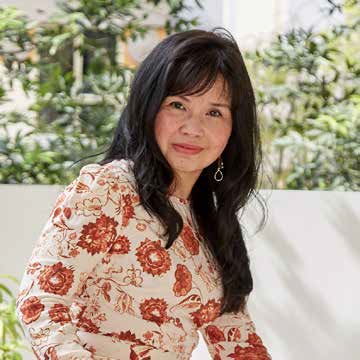<<The Brain Tumour Society Singapore conducts monthly support group meetings and regularly organises public awareness events.>>
Every success story starts with a dream. For the Brain Tumour Society Singapore (BTSS), it began with one woman’s personal mission to bring hope to people and families struggling with brain tumours.

<<Brain tumour survivor Ms Melissa Lim’s personal experience led her to assume leadership of the Brain Tumour Society Singapore. >>
Current president Ms Melissa Lim’s experience with brain tumours — first as a carer and later as a patient — had spurred her to provide an avenue for brain tumour patients and carers to support one another.
“My vision for BTSS is ‘dare to dream’. We want to push the frontiers for new treatment options, and an equitable education for children with brain tumours, many of whom struggle with mainstream education,” said Ms Lim.
BTSS, a finalist of the Singapore Health Inspirational Patient and Caregiver Awards 2020 (Patient Support Group Category), has undergone several changes in the last 20 years. It was started in 2000 by Dr Tan Siok Bee, Deputy Director, Nursing Division, Singapore General Hospital (SGH), and her colleagues. In 2003, meetings were discontinued during the Severe Acute Respiratory Syndrome (SARS) outbreak, but resumed the following year as a National Neuroscience Institute (NNI) support group. It was discontinued again in 2010 before Ms Lim took up independent leadership of the group in 2012. Having experienced the devastating disease twice, Ms Lim knows how it feels to be in despair.
Her own diagnosis in 2004 brought back memories of her late mother’s long battle with an aggressive and lethal brain cancer called glioblastoma multiforme (GBM). Watching her mother’s condition deteriorate was a painful and stressful experience, which intensified when she was put on palliative care.
Ms Lim, a consultant and adjunct lecturer, said: “At the point, I wished that I could speak to another family struggling with GBM.” Six years after her mother’s death, Ms Lim experienced the same feeling of isolation after a 16-hour brain operation at SGH to remove a 3.5cm tumour.
She suffered multiple postsurgery complications, including temporary paralysis on the right side of her face and slurred speech. It was at the height of the SARS outbreak. Unaware of any local support group for brain tumours, Ms Lim did not know where or who to turn to for information or support. “Recovery was tough,” she said. “To keep my spirits up, I talked to the nurses. Stories of brain tumour patients who recovered gave me hope that I, too, could do it.” The mother of two has since recovered from her condition.
Through the journey
In 2014, Ms Lim established BTSS as an official support platform for patients. BTSS formed a multidisciplinary medical advisory board that includes more than 10 clinicians from SGH, NNI, KK Women’s and Children’s Hospital, and other institutions to work with nurses in referring patients to BTSS.
“Our mission is to be with the patients and their families at every stage of the brain tumour journey. The support group is just one of the things we do at BTSS; we also look into financial assistance and advocacy work,” she said.
During the COVID-19 outbreak, BTSS continued to provide support to members via phone. Before the outbreak, BTSS provided monthly support group meetings and patient education talks at SGH, and financial help for those in need to defray costs of managing brain tumours.
The vibrant team at BTSS has organised several high-profile public awareness events, such as the Brainy Car Rally.
Pushing boundaries
Ms Lim is a member of the SingHealth Patient Advocacy Network (SPAN). Comprising volunteer patients and caregivers, SPAN works closely with the healthcare team to share perspectives on matters relating to the delivery of care, such as patient safety, with the aim of improving patient experience and outcomes in Singapore.
Today, BTSS has over 300 members. In the last five years, BTSS has received a total of four inspirational awards for individual recipients.
Ms Lim said nomination to the Singapore Health Inspirational Patient and Caregiver Awards this year is testimony to the hard work that BTSS members have put in. “It’s important to send the message that although we have or had brain tumours, we are still capable of doing meaningful work to make an impact,” she said.
BTSS beneficiary Smyth Woo could not work due to his rare brain cancer, which left him unable to walk. BTSS helped him procure a motorised wheelchair. He is so grateful that he now makes jewellery to raise funds for BTSS programmes.
For more information on BTSS, visit
www.braintumoursociety.org.sg
